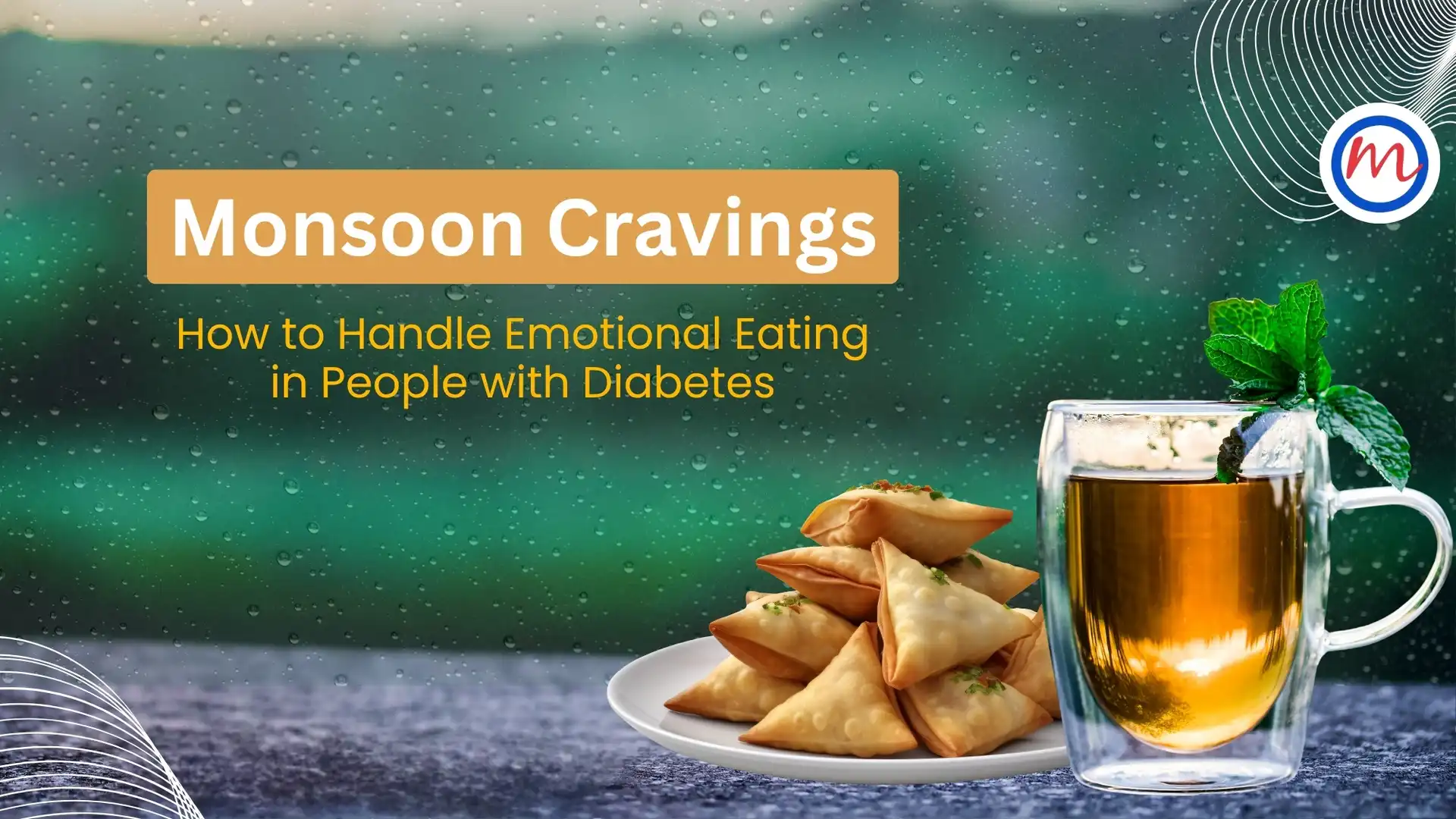Monsoon Cravings: How to Handle Emotional Eating in People with Diabetes
There’s something about rainy days that makes a plate of hot pakoras or a cup of sugary tea feel irresistible. The soothing sound of raindrops, cooler temperatures and the cosy indoors often stir emotions, and for many people with diabetes, this leads to emotional eating and sugar spikes. Emotional eating during the monsoon season can disrupt blood glucose control and overall health, but comfort food doesn’t have to come at the cost of your blood sugar control.
In this blog, we explore why emotional eating happens during the rains, how it affects people with diabetes, and simple, practical strategies to manage it healthily.
Why Monsoon Triggers Emotional Eating in People with Diabetes
Monsoon Triggers Emotional Eating and cravings in people with diabetes in several ways:
- Reduced sunlight exposure: Less sunlight lowers serotonin, the “feel-good” hormone, leading to mood dips and cravings for comfort foods.
- More indoor time: Staying indoors due to rainy weather can increase idle time and boredom, which often leads to snacking out of habit rather than hunger.
- Increased cravings for fried, salty and sugary foods: These foods are often associated with warmth and pleasure, making them appealing when the weather is gloomy.
- Emotional connections: Rainy days may remind people of nostalgic comfort foods linked to childhood or family memories, triggering cravings.
Emotional eating is often a response to boredom, stress, nostalgia or the desire to soothe uncomfortable emotions without addressing the root causes.
The Impact on Blood Sugar and Health
Frequent emotional eating during the monsoon can have multiple negative effects for people with diabetes:
- Unpredictable blood sugar spikes: Sudden intake of sugary or fried comfort foods causes sharp rises in blood glucose, making diabetes management difficult.
- Weight gain and insulin resistance: Consistent overeating or poor food choices can lead to weight gain, increasing insulin resistance and worsening diabetes control.
- Digestive and sleep disturbances: Heavy, oily foods can upset digestion and impact sleep quality, both of which affect blood sugar regulation.
- Increased cravings due to glucose roller-coaster: Spikes and crashes in blood sugar cause further cravings, creating a vicious cycle that is hard to break.
https://drmohans.com/smart-snacking-for-people-with-diabetes/
Signs You’re Emotionally Eating
Recognising emotional eating is the first step to managing it:
- Eating even when you are not physically hungry
- Craving specific “comfort” foods such as fried snacks or sweets
- Feeling guilty or regretful after eating
- Eating alone or hiding food to avoid judgment
- Reaching for food as a response to boredom, anxiety or sadness
How to Control Emotional Eating During Monsoon
- Recreate Healthier Comfort Foods
- Instead of deep-frying, try steaming or baking your favourite snacks to reduce oil and calories.
- Choose baked snacks made with whole grains that provide fibre and nutrients.
- Replace sugar with natural alternatives like stevia or fruit-based sweeteners to satisfy your sweet tooth without spiking blood sugar.
https://drmohans.com/diabetes-friendly-wheat-flour-cheela/
- Eat on a Schedule
- Don’t skip meals, as this often increases cravings and leads to overeating later.
- Keep fixed timings for your meals and snacks to maintain steady energy and glucose levels.
- Ensure every meal contains high-fibre foods and proteins to promote fullness and stable blood sugar.
https://drmohans.com/diabetes-meal-planning-tips/
- Manage Mood Without Food
- Take a short walk indoors or do gentle stretching to divert your mind from food cravings.
- Practice 5 minutes of deep breathing or mindfulness meditation to relieve stress and emotional triggers.
- Engage in hobbies like reading or painting, or call a friend instead of turning to food for comfort.
- Track Triggers in a Food Diary
- Note down the time you eat, your mood, hunger level, and what you ate.
- This helps you identify patterns of emotional eating and areas where you can intervene.
- Share your diary with your diabetes educator to get personalised advice.
Additional Tips for Emotional Eating Control During Monsoon
- Stay hydrated: Sometimes, thirst is mistaken for hunger. Drink plenty of water to keep cravings at bay.
- Create a supportive environment: Keep unhealthy snacks out of easy reach and stock your kitchen with healthy options.
- Sleep well: Poor sleep can worsen cravings and emotional eating tendencies. Prioritise good sleep hygiene.
- Seek emotional support: If emotional eating feels overwhelming, talking to a counsellor or joining a support group can help.
Don’t let monsoon cravings derail your health goals. At Dr. Mohan’s Diabetes Specialities Centre, our expert dietitians and diabetes educators will help you manage cravings, create balanced meal plans, and stay emotionally strong, rain or shine.
Book a consultation with our dietitians https://drmohansdiabetes.co.in/enroll/?campname=website
Visit your nearest Dr. Mohan’s Centre
Read more tips on Healthy Eating with Diabetes
For more
Importance of Routine Health Check-ups During the Monsoon for People with Diabetes
Monsoon Immunity Boost: Managing Seasonal Infections in People with Diabetes
Skin and Foot Care Tips During Monsoon for People with Diabetes



